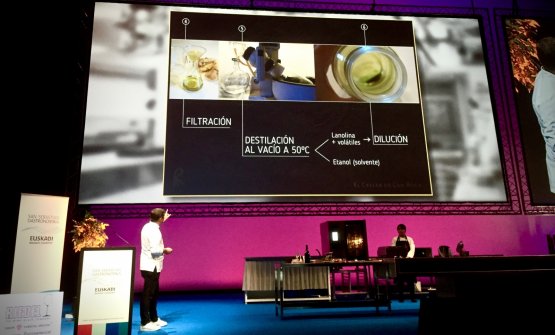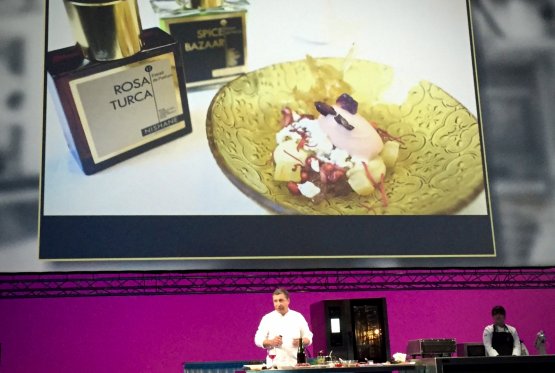Gastronomika 2015: there’s the recipes, the ingredients, styles and contaminations. And then there’s the Roca brothers, one kilometre above. They speak of the future, open new horizons, charm with their modest, elegant attitude. We’ve already written about Josep’s lesson on wine, nature and man in this piece, which was the highest moment in terms of culture and ethics. His big brother Joan instead offered a technical discussion worth to be noted.
Their permanent centre of gravity is Masía, «a space where a multidisciplinary dialogue is born that allows us to continue to dream, create – says the chef – It’s an incubator of ideas, a place where we train».
Masía is thus a physical and mental space for experiments; the tool is instead the Rotaval, a machine already used in biology labs, now adapted for fine dining: it is used for distillation (based on water, alcohol or reductions) in a vacuum at low temperatures, a unique process. Thanks to the negative pressure, the boiling temperature decreases, a unique condition that cannot be compared with any other steaming process, because at low temperatures food doesn’t run risk “cooking”. Hence the distillate will be pure essence.
The Rotaval is the focus of the interest of los tres hermanos. Jordi the pastry chef extracts aromas for his desserts. Josep distillates alcohol, «we want to create all sorts of possible drinks», says Joan. The latter, instead, obtains impossible to imagine aromas, that open new frontiers for cooking, «we’re entering a beautiful world».
There are many possible developments, now these barriers have fallen. A new drink is served in the room, it’s called figamel, a sort of low in alcohol mead with prickly pears and honey (the project is called Esperit: using herbs and fruits to create new pairings with specific dishes, «we’re exploring the boundaries of maridaje as never done before»).

The extraction process of "sheep wool essence"
Meanwhile
Joan surprises us: «We want to capture the flavours of products that are not edible ». And he explains the process with an extract of sheep wool: it is closed, macerated in alcohol for two hours at 45°C in a vacuum, then the liquid is filtered and processed in the Rotovapor at 50°C and then diluted. The final step is in the centrifuge, separating the lanoline from the essence of sheep wool.
Then the chef mixes sugar and glucose syrup at 133°C: the result is an elastic mixture aromatised with wool extract which he then works as a paste to make it look like sheep wool. He uses it to cover a quenelle of ice cream made with sheep yogurt: a surprising dessert.

The cooking tour experience, a project to enlarge the world’s cooking frontiers, crossing the frontiers themselves. In the photo, a dessert inspired by Turkey
New frontiers, that is. Unexplored territories, always richer thanks also to
The cooking tour experience, another project that has the
Roca travel around the world, cooking with new raw materials, facing new cultures, techniques, producers, foods, «we travel to experiment new spaces, this leads to further research and study». A tribute to a recent trip to Turkey begins, with all that came after it. A goosepimply finale: the boiling of seawater in a Tibetan bowl, only through sound. Striking.
As Xavier Agulló said from the stage, the Roca brothers are now a world heritage. Unesco should wake up.